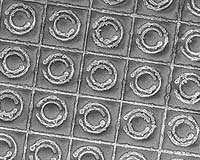 |
Washington (AFP) Feb 18, 2011 The United States should not try to stockpile precious elements for new energy technologies, experts said Friday after China announced plans to tighten control of its rare earths industry. Instead, the joint report by the American Physical Society and Materials Research Society urged the US government to promote research in alternatives for things like solar panels, wind turbines and electric cars, and to boost recycling of electronic devices. "We do not recommend economic stockpiling which we believe is a disincentive to innovation and has backfired in the past," said Robert Jaffe, co-chair of the joint study group and professor at Massachusetts Institute of Technology. "After all, many of these elements are not even found in significant deposits in the United States so mining independence doesn't even make sense," said Jaffe. "We have relied on trade with trading partners and to supply ourselves with these materials and others for a long time." The report did not limit itself to the so-called rare earths -- a collection of 17 elements that have become vital ingredients in high-tech products ranging from iPods to wind turbines. It included a broader group of what the team called "energy critical elements," or rare earths in addition to platinum group elements, photovoltaic ECEs and others, a group that totaled 29 items. China, which controls more than 90 percent of the world market for rare earths, said Wednesday it would tighten control over its industry, the latest step in a campaign to bring the lucrative metals under stricter regulation that has caused concern overseas that Beijing is abusing its market dominance. However, Jaffe pointed out that "many of the materials on the list are not particularly centered in China so this is not an issue of China versus the rest of the world." Thomas Graedel, director of the Center for Industrial Ecology at Yale University, said China does not have all the materials needed for every new technology. China "is depending on other countries for solar cell materials, for example," he said. "Technology these days is worldwide and the result is that the materials business is worldwide and everyone is really to some extent dependent on everyone else," Graedel said.
Share This Article With Planet Earth
Related Links Space Technology News - Applications and Research
 Lockheed Martin Collaborates With Penn State On Metamaterials Breakthrough
Lockheed Martin Collaborates With Penn State On Metamaterials BreakthroughNewtown PA (SPX) Feb 16, 2011 Lockheed Martin has collaborated with The Pennsylvania State University to develop a breakthrough material that can significantly improve the performance of spacecraft antennas. The electromagnetic metamaterial is considered to be the first commercially viable product of its kind and is one of the first practical implementations of electromagnetic metamaterials that improves a real-world d ... read more |
|
| The content herein, unless otherwise known to be public domain, are Copyright 1995-2010 - SpaceDaily. AFP and UPI Wire Stories are copyright Agence France-Presse and United Press International. ESA Portal Reports are copyright European Space Agency. All NASA sourced material is public domain. Additional copyrights may apply in whole or part to other bona fide parties. Advertising does not imply endorsement,agreement or approval of any opinions, statements or information provided by SpaceDaily on any Web page published or hosted by SpaceDaily. Privacy Statement |